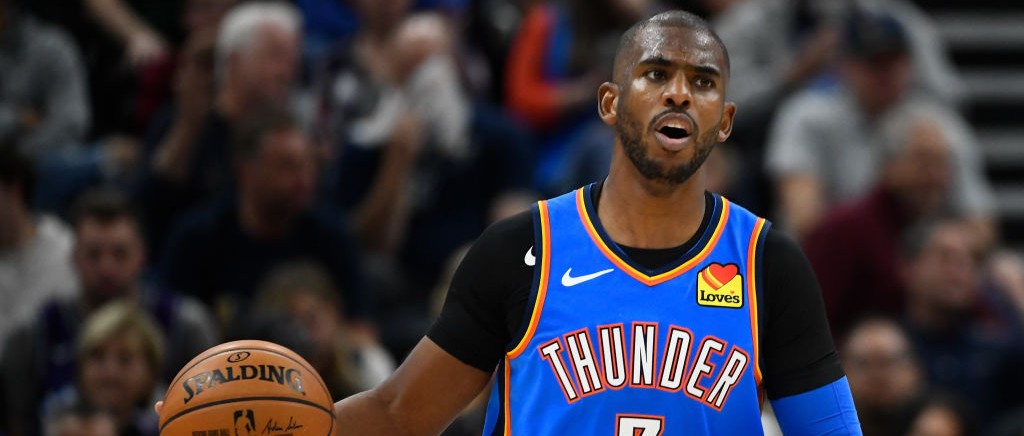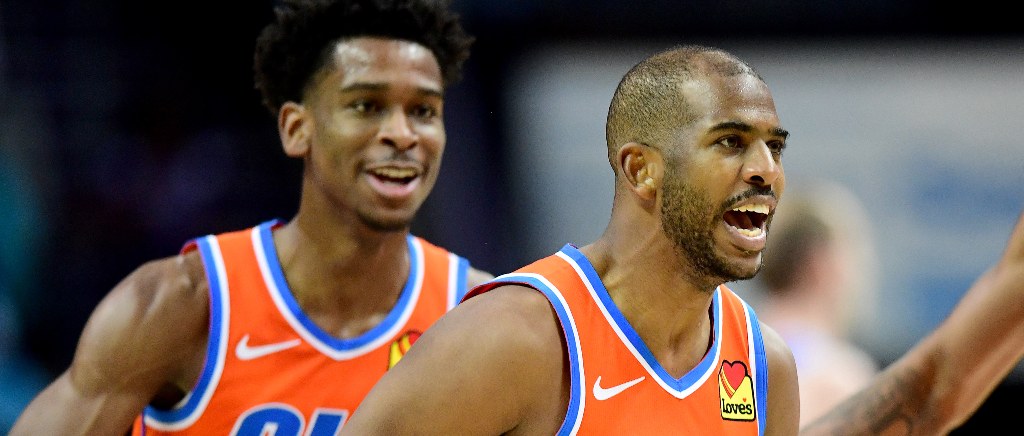The 2019-2020 NBA season came to an abrupt halt on March 11 due to the COVID-19 pandemic. With the season effectively three-quarters of the way through, many storylines, records-to-be, and developing comebacks were left in the lurch; all the bizarre, beautiful, and too-absorbing minutiae of the league halted. This is a look back at the most compelling of those suspended narratives in an attempt to figure out what could have been while reconciling, maybe wrenchingly, that however the season concludes, this will be a year in basketball that never fully happened. Welcome to Year None.
Chris Paul looking out on the plains of Oklahoma and deciding, “here’s good,” was not how anyone thought this was going to go. He’d been all over the map, from Type A to mercurial, but he’d yet to make a trip to quietly sustained, let alone stay there. It couldn’t be a pioneer story, because Russell Westbrook had been the tale told ‘round the TV’s glow in Oklahoma City living rooms for years, but it could be, maybe, a cowboy one.
Paul is a loner. He likes it best. Where it’s been difficult for him is where he is not expected to run efficient circles around everyone — his adversaries, his teammates — and instead must circle the proverbial wagons. Where he’s delayed, either by the minds around him not churning through the metrics of the floor, basketball as data, a map, or by his own sense of perfectionism. To Paul, like the rare handful of others — Kyle Lowry, Damian Lillard — who can look out at a court underway and already see all the ways it’s going to unfold, basketball is best when it’s hard. Make no mistake, he can make it look easy: his rapid, flowing drives, his lazy-looking pull-up jumpers. But his mind, while working, is a set of gritted teeth.
It’s why so many find it hard to be a fan of Paul, because it’s not easy. He can be snappish, standoffish, assertive, smug and a taskmaster, all in one game. And he doesn’t necessarily have the kind of flair others do when making these same demands. Jimmy Butler can be obstinate, but he’s flashy, cool, funny. And Lowry, who is similar to Paul in how he gets under guys’ skin, stays there and stays annoying, is beloved because he is tough, compassionate, and, most of all, loyal. Paul has a lot of these same qualities, if you watched him as the proverbial mayor of Lob City then you understood instantly how much he meant to a team regaining its identity and simultaneously being squeezed of it with every year they almost made it.
But backing up, you can’t unravel the trickier parts of Paul without tracing the difficulty of his career back to its beginning. In high school he was named North Carolina’s Mr. Basketball and in college he punched another player in the groin the the last game of his sophomore year. He went fourth in the NBA draft and played the first two years of his professional career for the Hornets in Oklahoma City, because New Orleans was dealing with the devastation of Hurricane Katrina. It would have been disruptive for anyone, but to be named Rookie of the Year in the aftermath of that, playing for a city that has a gravitational pull toward it in the south, especially hailing from a half day’s drive away, and not getting to claim it, would have been like a weird stasis.
He had a hefty contract extension and a budding team on his shoulders when the Hornets fired Byron Scott. Paul, 24, criticized the decision by questioning why he was never consulted with it. For any player, this kind of inquiry is a tightrope — lean too far in one direction and your alignment looks torqued by favoritism, go the other way and it’s clear you’ve got a larger say in the team, the likes of which a rare few superstars get to voice — but for a third year player it sent Paul tumbling into the kind of scrutiny he’s never, not yet, not really, escaped.

The through line of Paul’s career has more been the process of unraveling one knot after another. He almost never made it to Los Angeles, his trade, instead of being between two franchises, fell to David Stern. The NBA being the temporary holders of the Hornets franchise before new ownership arrived, and Stern, determined to play the role of aggressive owner seemed incensed with getting the best deal for a team he was, essentially, playing pretend with, famously rejecting a trade that would send him to the Lakers. Eventually, he would be allowed passage to Los Angeles, but instead of the legendary purple and gold, it was for the often cellar-dwelling red, white, and blue of the Clippers.
Cruelly, it seemed the pace of those largely unmarred years in New Orleans finally caught up, jackknifed, and blindsided Paul just as the velocity of his career — his real career — was about to get underway. As analytical and diligent as he can be, the kind of basketball Paul got to play in L.A. in bright, flashing bursts was what he should have been doing all along. He was the perfect oscillator between Blake Griffin and DeAndre Jordan, his speed the humming center that kept things tight, together, with these starburst offshoots that had him rocketing alley-oops to the thundering hands of Jordan or Griffin. He played so fast but it never felt downhill, and there was always a hum of immaculate control growling out from under his smirk.
He relished the attention, loved being on what was touted as the underdog team in a market where it was actually impossible for that to be true, because it was still big enough, with revenue and fans enough, for two. Paul knew, he’s one of the smartest players in the league when it comes to control, autonomy and the optics of a career, he would never play where there was a real chance of being eclipsed. But the myth of it made it so there would always be eyes on him.
The Clippers nailed the repetitions of heartbreak. As soon as Paul got there the team went farther than it did in five years, and then never past that. Injury dogged Paul and Griffin in a bitter relay, lapsing them both for long bouts so that even in the rare times both were healthy and back to playing together, that rhythm of those first two seasons never quite came back full bounce.
When Paul made for Texas the team came apart behind him, their speedy reactor gone. The value of Paul’s stardom seems to fluctuate a hell of a lot more than others in the league in his echelon, when it should be handled the way we do gold and measured against. It took seven players, a fully functional starting lineup and two relief guys if that is more decipherable, a first round pick and money all talking to get Paul to walk under the bleached out cerulean skies of Houston. He hadn’t left it all behind him, though, injury clung to his body like an incorrigible burr. But when he played — oof. If you didn’t like Paul before, found him calculating, full of himself, man you were not going to like him here.
It’s a shame that the Rockets were not able to better alchemize whatever it was between Paul and James Harden, because when it spilled out on the floor, it was scorching. Paul played, when he played, both of those seasons mean. He understood intimately that with Harden there was no point in trying to establish a dialogue, a two-way relationship where all the signs were already pointing in one, extremely ISO direction. All Paul really did was take the mandate of the Rockets and play, crushingly, along. Mike D’Antoni wanted ball dominant, he got it. But just when it seemed he’d fallen completely into the tunnel of himself there would be smoke signals on the horizon, messages back home. He favored Clint Capela and Nene with the kind of lobs he once served Griffin and Jordan, but it felt lonesome, too earnest for the Rockets, and it wouldn’t be long until he was back on the perimeter, passing to no one and tossing daggers whenever he got half a look.
Houston was averaging 57 wins a season and Harden wanted Paul gone. So much so that with just one year ticked off Paul’s four-year, maximum extension, and Daryl Morey having promised him explicitly that OKC was not an option, the Rockets sent him just out of state lines in something that looked a lot, initially, like exile.

But if this past summer showed us anything, it’s that the Thunder — which, of course, once traded Harden — understand that it’s better to trade a star and get things back rather than ask them to stick around before they end up leaving. With Paul George, they got two seasons out of a player who was initially anticipating a skimming stopover and who, when the Thunder did right by George and sent him home, was reluctant to leave. Westbrook’s departure too, as abrupt as it was for Paul, could be rooted in reunion. Weary and wary, when Paul showed up on the disorienting back of summer 2019, he took his new team to dinner. He had, after all, come a dizzying full circle.
And something’s happened this season as the brace of expectation has slipped — Paul’s stayed healthy. Without reeling between pressure and disappointment as he did with the Clippers, and finally able to step into the proverbial sun and out from Houston’s exhausting isolation, Paul’s loosened up. He’s playing pure point with more confidence than he ever did in L.A. and has a younger roster that’s much easier with itself around him. Shai Gilgeous-Alexander, OKC’s best new hope, has fit snugly under Paul’s wing, but is, generationally, a different kind of player than Paul has known. An astute, quick learner on court as much as off, tapped in at all times and aware of a much wider world than Paul was at that point in his career. This Thunder team takes him seriously, but they tease him, giving the veteran in Paul a new kind of levity. Add in the stunningly effective firebrand of Dennis Schröder off the bench and the steady, no bull Steven Adams, and Paul is, for the first time, on a team that’s got nothing to prove.
Strange things happen when teams are taken out of “official” contention, they typically play better. Billy Donovan has a light hand and is willing to let things roam on court, partially due to seeing the long road of a rebuild rise up in front of him, and because he’s learned to work with what he’s got. For all his perceived faults, Paul isn’t really an outsider. A loner on court in how much he plays inside his own head, yes, but he was thus far happiest on a team humming along at the same clip, an important part of something. In Oklahoma he gets to have that again, he also, if he wants it, gets to have the kind of say in a team that he wanted the first time he set foot in the Sooner State a decade ago. In December, he bought them all suits. If he stays through the tumult of this season, who knows what next Christmas can bring.
What if the end of Paul’s rope isn’t? What if it’s adjustable as he is, a lasso he can use to snag what he wants the last range of his career to look like? Out there on the plains he’s got nothing but full vantage in every direction, a team to teach and learn from, and plenty of space. Out there on the plains, Paul has all the more room to run.







